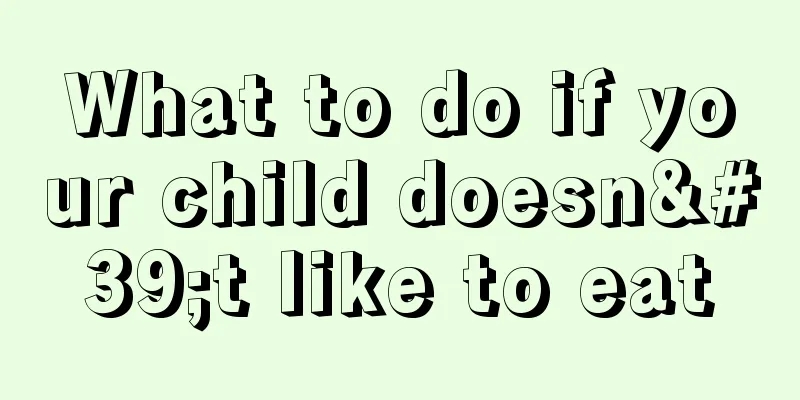What to do if your child doesn't like to eat

|
Many parents will encounter a lot of troubles when it comes to their baby’s eating. Many children don’t like to eat, and even if they do eat, they will be picky eaters and have anorexia. They will get very angry every time it is time to eat. If children often don’t like to eat, it will have a great impact on their physical development, and their development will be very slow. It will also be a headache for parents. Today we will see what to do if children don’t like to eat. Nowadays, many babies are a cause of concern for their parents when it comes to eating. They often don’t like to eat, are picky eaters, and have anorexia. If this happens frequently, the child’s immunity will be very low. But what should we do if children don’t like to eat? Many parents want to know more about this issue. How to deal with babies who don’t like to eat Parents’ anxiety about their children eating less or skipping meals is mainly because they are worried that their children are not getting enough nutrition and will not grow as tall as other children. In fact, each child’s future height, weight and appearance is not only related to nutrition, but also has a lot to do with genetics. In addition, there are individual differences in the growth rate of each child. If the difficulty in eating exists for a long time, a specific analysis is required. To avoid children having difficulty eating, parents are advised to pay attention to the following points: 1. Family members should set a good example for children and let them understand the importance of eating and dining etiquette. Maybe at a certain period of time, the child’s behavior does not meet the expectations of adults, but as long as persistence is achieved, the child will naturally accept these good behavioral patterns. 2. Good dining and eating habits must be developed from an early age. When children cannot walk yet, set a fixed dining table and seat, and eat happily. If you persist for a long time, behavioral patterns will be formed. 3. Avoid strenuous exercise before meals. Strenuous exercise before meals can easily cause stomach pain. 4. Eat quietly. Don’t play while eating or watch TV while eating. 5. If the child really doesn’t want to eat, it means that the child is not really hungry. Don’t force him. Skipping one or two meals will not starve the child, but forcing the child to eat will cause anorexia. Therefore, try not to force your children to eat. Instead, encourage or guide them to make them feel that eating is a pleasure. 6. Try not to let your children eat snacks before meals, especially desserts, chocolate, ice cream, etc., which will make the children wait for meals with an empty stomach and be hungry and eager to eat. Parents should also spend more time learning about early childhood nutrition and cultivate their baby's eating habits in the normal development process with a relaxed and understanding attitude. In line with their physical and mental development, we provide them with nutritious and delicious meals that are attractive in color, aroma and taste, so that their nutritional intake is balanced, and they like to eat quietly by themselves and develop good eating habits. Baby eating precautions It is natural to eat when you are hungry, but many children who look cute at other times have all kinds of problems when it comes to mealtime: they are picky eaters and don’t eat vegetables or fatty meat; they turn around and leave after taking a few bites, but as soon as the adults finish clearing the table, the children open the refrigerator to look for food... Parents always complain that their children are ignorant, but in fact, all these problems of children are "carefully cultivated" by their parents. Are there any of these misconceptions on the dining table at your home? Dinner table misunderstanding 1: chasing children to eat Chinese parents always want their children to eat more. "Only by eating more can they grow taller" and "Mom cooks such delicious food, but you only eat a little. No, eat a few more bites." With these voices most often heard at the dinner table, the matter of children's eating has gradually changed. When they are young, parents have to chase them to feed them. When they grow up, they have to force them to eat, making the dinner table like a battlefield. After a meal, parents are exhausted and tired. Is it good or bad to chase children to eat? How to make children eat properly? Dinner table misunderstanding 2: Scolding children at the dinner table Surveys show that more than half of children have been criticized by their parents at the dinner table. Many parents are busy with work and rarely sit with their children, so dinner time becomes an important time for parents to care about their children. They first ask about their academic performance, then their thoughts, and then they lecture them endlessly. But do you know what harm it brings to children when they are scolded at the dinner table? Table Misconception 3: “Eating without Table Manners” Eating properly has always been a tradition in our country, but many parents have gradually ignored this issue. Some parents, out of love for their children, let their children do whatever they want and have no rules when it comes to eating. In fact, this behavior is harmful to children's future behavior habits. Table Myth 4: Feeding Environment Doesn’t Matter When some children are eating, people around them chat all the time, which makes it difficult for the feeder to concentrate on feeding the child or communicating with the child. The child's attention is easily distracted, which is very bad for the child. The growth of children at this stage is very important, and the body also needs a lot of nutrition. If they don’t eat well often, many nutrients will not be able to keep up, which will have some impact on the child’s body. I believe that the issues we introduced today about what to do if children don’t like to eat are very useful for parents. We must find some appropriate methods to deal with the phenomenon that children don’t like to eat. |
>>: Allergic asthma in children
Recommend
What causes redness and swelling around children’s eyes?
Every child in the family is a treasure, so once ...
What is the reason for a child's high blood count?
There are many problems with blood counts, which ...
What kind of milk is suitable for a three-year-old child?
Three-year-old babies are in the period of growth...
At what age does the baby stop eating milk powder?
When the baby is just born, we generally recommen...
Seven things that ancient parents should not blame their children for
1. Don’t blame in public: Don’t blame your child ...
What are the left brain development trainings for children?
This is an era that emphasizes knowledge and tech...
What are the dietary remedies for babies' sneezing and runny nose?
What are the dietary remedies for babies' sne...
Do children need to fast for physical examination?
When we take a new job, we need to have a physica...
What is the most nutritious breakfast for children?
The growth of children is something that parents ...
What to do if children feel dizzy, nauseous and vomit
Nowadays, many children suffer from many diseases...
Can I take a bath every day after the full moon? What are the consequences?
In the hot summer, our bodies secrete more becaus...
How to correctly perform massage for children with diarrhea?
Children's gastrointestinal function is not y...
What should I do if my seven-year-old child has a poor memory?
Seven-year-old children are learning and just ent...
Why does a 2-year-old baby cry when sleeping?
We all know that babies have different growth and...
How much lead is normal for an eight-month-old baby
Lead is a trace element in the human body and pla...









